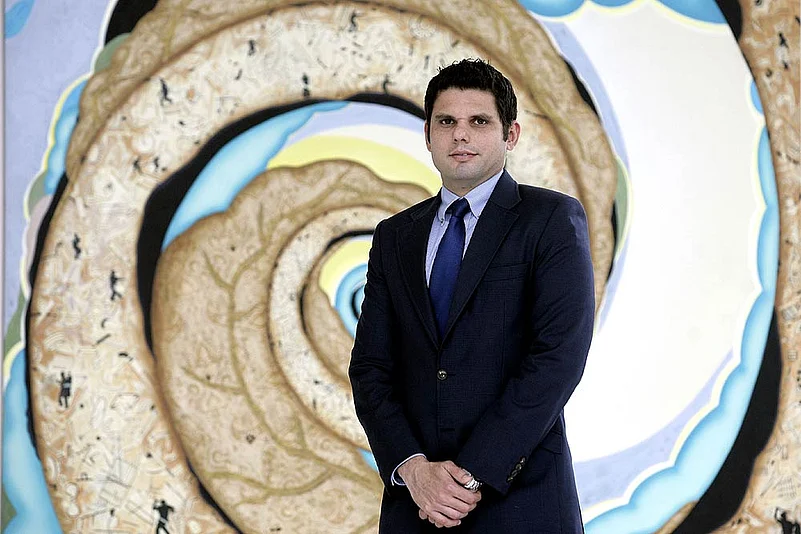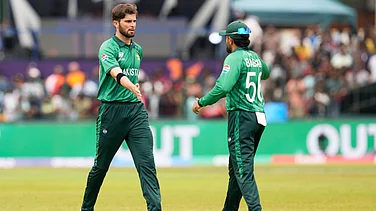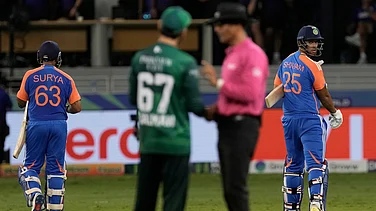- Over 17 years as Sachin Tendulkar’s manager taught Vinod Naidu a big lesson in humility
- Rhiti Sports chief Arun Pandey says M.S. Dhoni’s calm and composed nature impressed him the most
- Yuvraj Singh’s manager Aneesh Gautam feels there is nothing more important than relationships in this field
- One must have a lot of patience to manage athletes, says Rashid Khan of Signatures Sports & Entertainmen
- Knowing athletes’ needs is important, says JSW Sports CEO and ex-India tennis player Mustafa Ghouse (above)
- Das Blah brothers Anirban and Indranil of CAA KWAN, say managing athletes is largely a matter of being practical
***
They are the people sportspersons fall back on in times of adversity, distress and poor form on the field of play. And they have often been criticised for some of the ills in Indian sports, particularly cricket. But, irrespective of public perception, player-agents are the ones who sportspersons are increasingly looking up to for financial as well as emotional support. These agents, or personal managers, provide sportspersons the comfort they need during tough times, or when they swim against the tide. Managers fashion players’ public images through glory and adversity.
Top player-agents admit that they have learnt much by handling top athletes over the years. They say that, since athletes are an emotional lot, they need proper caring; that money is not everything; that a deal can be missed if, in the long run, it hurts a player; and that relationship with athletes should be on top of an agent’s priority list.
Some managers say they have learnt the virtue of remaining patient with athletes who are sensitive and often unaware of how the market works. They need to be properly guided and kept in cotton wool, so to say.

Rashid Khan, who manages Amit Mishra, Imran Tahir and Pollard
Many agents who handle athletes’ portfolios have been management students, but many have never played at the highest level. For other managers, like former first-class cricketer Arun Pandey and Asian Games tennis medallist Mustafa Ghouse, it is perhaps easier to understand the mindset and requirements of players.
“Since I’ve been a cricketer, I know what cricketers need. Foremost is peace of mind. Second, when a cricketer returns to the pavilion after spending time in the field he is tired, he needs time to think about his game. Player-management is a very, very sensitive job,” Arun Pandey, chairman and MD of Rhiti Group, which handles M.S. Dhoni and other cricketers, told Outlook.
Mustafa Ghouse, CEO of JSW Sports, says the experience of having played tennis for India is coming in handy. “From being an athlete myself to managing athletes is an interesting journey. I have been able to fill the gap that athletes face when they are developing. It’s important to know the mindset of an athlete,” he points out. “I feel I have had an opportunity of relating to what younger athletes are going through. And they know that when I talk about something, I have experienced some of those challenges that they face.”

Vinod Naidu, the personal manager to Sachin Tendulkar for long
Vinod Naidu may not have played India, but he got the opportunity to learn from being the virtual shadow of that most popular Indian sportsman, Sachin Tendulkar, for over 17 years. He first handled Tendulkar’s portfolio as vice-president (player management) of WorldTel Sports India (from 1998-2005) and then as VP of the World Sport Group (2007-2015), after the legend signed with the company.
Despite not having gone through a professional course in athlete management, Naidu not only became a successful manager, but also won Sachin’s trust and became a “part of his family”, as the maestro put it in his farewell speech at the Wankhede Stadium in November 2013.
“A big source of my inspiration came from the humility with which Mr Tendulkar leads his life, given the success he has achieved,” Naidu, who co-founded NuStart Ventures this January after parting ways with Sachin last year, told Outlook. “Further, single-minded focus, hard work, not being afraid of failure, self-belief, respect, and the idea of building and maintaining relationships have helped me through my professional career. Every day creates a new learning experience for me,” he says.
The Das Blah brothers, Anirban and Indranil, like Naidu, stress on an upward learning curve. After they partnered former tennis star Mahesh Bhupathi to launch GloboSport over a decade ago, they, too, learnt important lessons through handling athletes.
“From athletes I’ve learnt that talent is not enough, nor is intelligence, if people are not disciplined and prepared to work hard every single day. And if you are not mentally tough to deal with rejection and failure, you are not going to make it,” says Anirban, founder and MD, CAA KWAN Entertainment and Associate Companies. “Working with elite athletes, I learnt that unless you are disciplined in times of adversity, you can’t be successful. That’s applicable to all of us in real life,” he says.
Indranil, who looks after the sports segment of the firm and manages Sania Mirza and Abhinav Bindra, emphasises that honesty is the best policy, even while dealing with athletes. “The client’s or athlete’s interest comes first. Second, you always need to be honest and transparent with them. There’ll be times when you’d think that a deal would be better for the agency or for yourself, and you may not put your client before that. But as long as you are honest with your client and don’t put yourself before the client it’ll be better for you as an agent in the long run,” he explains.
For Rashid Khan, director of Signatures Sports and Entertainment, which manages the portfolios of leg-spinners Amit Mishra and Iqbal Abdullah, South African Imran Tahir and West Indies’s Kieron Pollard, the biggest lesson was to have patience.
“Cricket is a very uncertain game. Let’s take Virat Kohli and Dhoni as examples. Virat is performing consistently. Before him, Dhoni was consistent. In between, there was a dip in Dhoni’s form. But whether it’s Dhoni or any other cricket celebrity, people started criticising them after one or two poor performances,” he says. “So, at times, their anger is aimed at you [agent]. So you have to very patient when a player is going through a rough patch,” says 32-year-old Khan.
Khan also says that at times even good performances don’t fetch endorsements. “Former India pacer Lakshmipathi Balaji, for example, performed so well in 2003-04 in Pakistan. Despite that he didn’t get to endorse a single brand. It’s also about how you place your player in the market to get some value in terms of monetising him,” he stresses. “These are things I’ve learnt in about six years.”
Relationships between agents and athletes are both sensitive and significant. Aneesh Gautam, who handled Virat Kohli when he was with Cornerstone, says it’s the single most important thing for him. “You have to always maintain relationships. If you don’t, you can’t survive in this industry. Everything else comes under relationship,” says the current personal manager of Yuvraj Singh. “The other thing I’ve learnt is to never say ‘no’ to sportspersons, and provide service to them at all times.”
Yash Motwani (28), a former personal manager of pacer Ishant Sharma, says the biggest lesson he learnt was tackling pressure. “I learnt multi-tasking and handling pressure.... The other challenge was image maintenance of athletes,” says Motwani, who handled several cricketers while at TechShot Digital.

What have these agents to tell aspiring B-School students who want to get into athlete management?
“You’ve got to be passionate about sports or the athletes you’d be working with. That’s the most important thing. You need to work hard. And you really need to understand athletes’ requirements,” says Ghouse.
Pandey, who represented Bihar and Uttar Pradesh in Ranji Trophy from 2000-03, says being practical is important. “When I was working with Indian Airlines, I did a course in man management. That helped me when I took up managing athletes. But player-management is all about being practical, not about what’s written in books.”
Both Anirban and Indranil concur with Pandey. “When people approach me, I tell them to unlearn a lot from what they learnt at the B-school. I think B-School is good for technical knowledge, on finance, structural or financial modelling,” says Anirban. “So whether it is working in sports or entertainment or any field, when you get out of B-School, start with an approach saying that I’ve added some context and nothing else and I’ll do whatever I have to with humility and the desire to continue to learn. That’s the most important advice I would give them.”
Indranil adds another dimension. “When managing an athlete you have to also follow your gut and your heart. That’s something books don’t teach. I think that’s critical,” he says. “Use common sense and emotions also, because you are dealing with emotional people, human beings. So, it can’t only be a business decision. It needs sentiments or emotions attached also because an athlete’s career is much, much shorter than that of other professionals, and he’s putting his entire career in your hands.”
Naidu chips in: “I’ve been counselling students towards a career in sports, and I hope that we will have even more students pursuing their passion for sports, by availing themselves of the increasingly rewarding opportunities that the business of sports has to offer.”
There’s a lot to learn for aspiring students from the Tendulkar-Naidu partnership, which withstood 17 years of pressure. It was based mainly on honesty and transparency, with the manager always preferring the back seat and letting the maestro take the centrestage that he owned so often.


























